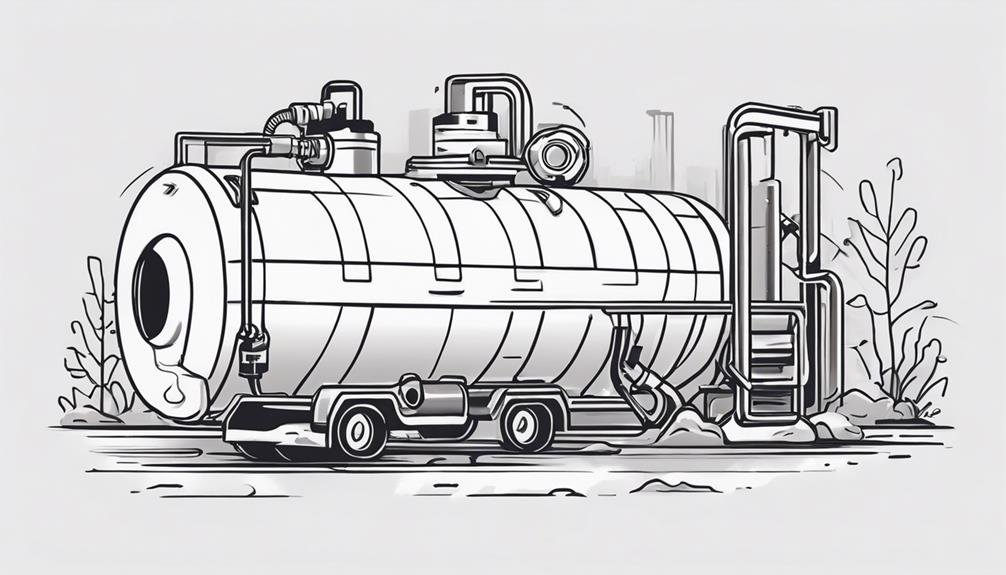When it comes to maintaining your septic tank, you might feel like you're navigating a complex maze. However, by implementing top strategies, you can ensure your system works efficiently for years to come.
From setting up a regular maintenance schedule to understanding proper waste disposal practices, these key tactics will help you avoid costly repairs and keep your septic tank running smoothly.
But what about unexpected challenges that may arise? Let's explore how inspection and monitoring tips, along with the option of hiring professional pumping services, can be your saving grace in the world of septic tank maintenance.
Key Takeaways
- Adhere to a regular maintenance schedule every 3 to 5 years for optimal septic tank health.
- Educate the community on responsible waste disposal to prevent system issues.
- Regularly inspect and monitor the tank to catch problems early and avoid costly repairs.
- Consider hiring professional pumping services for expert care, efficiency, and long-term savings.
Regular Maintenance Schedule

To maintain the optimal functionality of your septic tank system, it's crucial to adhere to a regular maintenance schedule. This schedule should include a proper pumping frequency based on your tank capacity. The pumping frequency is influenced by the size of your tank and the number of occupants in your household.
Typically, it's recommended to pump your septic tank every 3 to 5 years for an average household with a tank capacity of 1,000 gallons. However, if your tank is smaller or you have a larger family, more frequent pumping may be necessary to prevent overflow or backups.
Understanding your tank capacity is essential for determining the right pumping frequency. Tanks with larger capacities can hold more waste before needing to be pumped, while smaller tanks require more frequent servicing. By staying aware of your tank capacity and adhering to a regular pumping schedule, you can ensure the longevity and efficiency of your septic system.
Proper Waste Disposal Practices
Maintaining proper waste disposal practices is essential for the efficient operation of your septic tank system and to prevent potential issues such as clogs or system failure. To ensure eco-friendly solutions, it's crucial to avoid flushing non-biodegradable items like paper towels, wipes, or feminine hygiene products down the drain. These items can accumulate in the septic tank, leading to blockages and costly repairs.
Community education plays a vital role in spreading awareness about the importance of responsible waste disposal. Encouraging neighbors to adopt proper disposal habits can benefit the entire community by reducing the risk of environmental contamination and preserving the longevity of septic systems. Additionally, using septic-safe toilet paper and household cleaners can help maintain a healthy balance of bacteria in the septic tank, promoting efficient waste breakdown.
Inspection and Monitoring Tips

Inspecting and monitoring your septic tank regularly is crucial for identifying potential issues early and ensuring the system functions efficiently. To maintain optimal performance, you should be aware of your tank's capacity and pumping frequency.
Understanding your tank's capacity is vital as it determines how often you need to pump it. A general rule of thumb is to have your septic tank pumped every 3 to 5 years, but this can vary based on factors like household size and water usage.
Monitoring the level of solids in your tank is also essential. You can do this by inspecting the tank's sludge and scum layers annually. Keeping track of these layers can help you determine when it's time to schedule a pump-out.
Additionally, be mindful of any unusual odors, soggy areas around the drain field, or slow drains, as these could indicate a problem with your septic system. Regular inspections and monitoring are key to preventing costly repairs and maintaining a healthy septic system.
Hiring Professional Pumping Services
Regularly monitoring and inspecting your septic tank is crucial to ensure optimal performance; however, when it comes to maintenance tasks like pumping, hiring professional services can provide expertise and efficiency. Professional pumping services offer a range of benefits that DIY alternatives may not guarantee. These experts have the necessary equipment, training, and experience to pump your septic tank correctly, minimizing the risk of potential issues or damage. By entrusting this task to professionals, you can have peace of mind knowing that it's being handled by individuals who understand the intricacies of septic systems.
While DIY alternatives may seem like cost-saving options initially, they can lead to costly repairs if not done correctly. Professional pumping services can actually save you money in the long run by ensuring that your septic tank is properly maintained and preventing any major problems from arising. Additionally, these services can be more time-efficient, allowing you to focus on other important aspects of your life without worrying about the upkeep of your septic system.
Frequently Asked Questions
How Can I Prevent My Septic Tank From Freezing During the Winter Months?
To prevent your septic tank from freezing during winter, consider insulating techniques. Insulate the tank and pipes with materials like foam board or blankets. Keep the tank active by running warm water periodically. Consult professionals for effective solutions.
Is It Safe to Use Septic Tank Additives to Improve System Performance?
Using septic tank additives might seem effective initially, but it can have long-term consequences on your system's safety and the environment. Consider the environmental impact and weigh the effectiveness against potential risks carefully.
Are There Any Eco-Friendly Alternatives to Traditional Septic Tank Pumping Methods?
Looking for sustainable practices for septic tank maintenance? Consider eco-friendly alternatives like enzyme additives or bacterial treatments. These green options can help break down waste naturally, reducing the need for traditional pumping methods.
Can I Plant Trees or Build a Structure Over My Septic Tank Without Causing Damage to the System?
You might think planting trees or building over your septic tank is harmless, but be cautious. Tree roots can infiltrate and damage systems, while heavy structures may compromise it. Consider landscaping restrictions for system longevity.
What Are the Signs That Indicate My Septic Tank Needs to Be Pumped Sooner Than the Recommended Schedule?
If you notice slow drains, odors, or pooling water near your septic tank, it's an early warning sign that it may need pumping sooner. Regular inspection and maintenance tips can help prevent costly issues.
Conclusion
Congratulations on mastering the top septic tank pumping strategies! You've taken the necessary steps to ensure your system runs smoothly and efficiently.
Just remember, even the most well-maintained septic tanks can surprise you. So keep an eye out for any unexpected issues that may arise.
After all, who doesn't love a little irony in the world of septic tank maintenance? Keep up the good work!

